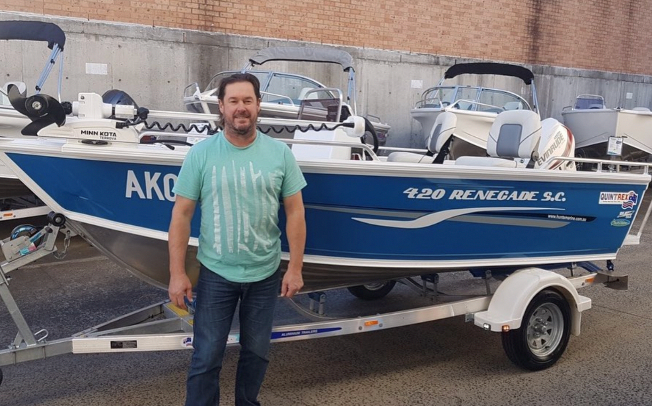
At Hunt's Marine we make owning and maintaining a boat simple!
Here’s our simple guide to buying your first boat and everything you need to know to keep you, your family and friends safe on the water.
1. The first step is to determine what you want your boat to do!
Depending on the activity, you may be better splashing on certain features over others. Are you dreaming of overnight trips? A boat with a cabin for you to sleep in will be a must. Planning on fishing in open waters? A larger boat with a top that can shelter you from the elements will be handy. Is towing skiers or wakeboarders on the agenda? A boat with an A-frame for wakeboarding and a hull shape that produces a satisfactory wake may be best.
2. The next step is to create a shortlist of your favourite boats that will meet your needs.
The Hunts Marine's website has a large variety of both new and used boats
When it comes to getting into boating, it’s worth considering whether you want to a buy new or used boat.
If you're open to both, you'll have access to a much greater variety of boat types and prices. Hunts Marine has a large variety of both new and used boats. Our new boats are from trusted brands like Quintrex, Cruise Craft and Glastron, and come with manufacturer warranties. Our used boats all undergo comprehensive testing before being put on sale - a compression test of all cylinders, an inspection of gearbox oil to test for possible water entry and a check of steering systems. With such rigorous checks, we confidently offer a full warranty on ALL our used boats at Hunts Marine.
3. The final step is to conduct a walk-around and sea test drive
A walk-around is more important for used boats, but it is a worthwhile step for new boats too. You want to get a feel for the boat and see how it functions in a real-world environment.
Getting a boat out on the water is the best way to learn its character so a sea-trial is, a must. There are all sorts of things you can find from this that you wouldn't be able to determine otherwise - whether the boat has enough power, how quick it is to plane, whether the electronics work in the field, what the visibility is like from the driver's seat, and how the boat takes corners.
Do you see buying a boat in your near future? Contact the team at Hunts Marine for more information on how we can help find the boat for you.
Before you head out on the water, here are a some of the rules, regulations and required safety equipment you'll need if you're going boating in New South Wales.
Important Boating Rules and Regulations
- Speed
Many areas have designated speed limits; these must be followed at all times.
- Bow riding
This is not permitted, in any circumstance. Bow riding refers to both extending part of your body outside the perimeter of the vessel that's moving and being in a position where the risk of falling overboard is increased.
- Giving way
Boats that are engine powered must give way to a variety of other crafts, including:
- Sailing boats
- Anything approaching head on (alter course to the right)
- Anything approaching from the right
(Boats need to stay 60 metres away from people or dive flags in the water.)
Safety Equipment
Enjoying your time on the water should never come at the expense of safety. Here are a few key safety items to have on board.
- Lifejackets
On any recreational vessel, lifejackets are far and away the most crucial piece of safety equipment. Should you fall overboard, they can be the thing that saves your life
- Bailer/bucket/fire bucket
It's a requirement for at least one solidly constructed bucket of metal, robust canvas or plastic with an attached lanyard to be on board at all times. This is useful for bailing water from your boat and fighting fires.
- Anchor
This is another requirement for all vessels. You should choose an anchor that's appropriately sized for your boat.
- Fire extinguisher
All vessels that have an electric start motor, gas installation, fuel stove or battery are required to have a working fire extinguisher on board.
- Oars and/or paddles
For most boats less than six metres long, oars with rowlocks or paddles are required to be on board, unless there's another means of propulsion, like a secondary engine/outboard.
- Floating torch and sound signal
You'll also need to have a waterproof, floating torch on board and a method for signalling other vessels with sound, like a horn, bell or whistle.
- EPIRB
An Emergency Position Indicating Radio Beacon (EPIRB) is recommended for those boating in risky or remote areas, and it's a requirement if you're boating more than two nautical miles from the shore.
If you have any questions about your first boat and would like some more expert advice, get in touch with the crew at Hunts Marine today.
Happy Boating from the Hunts Marine team!




